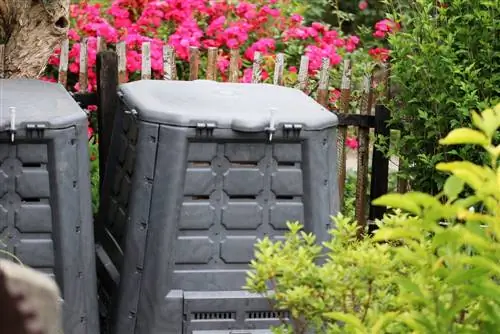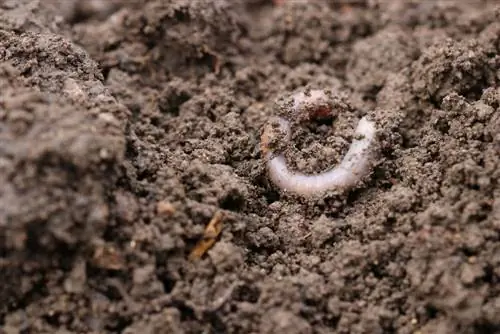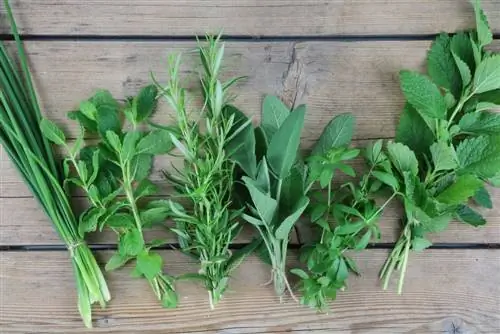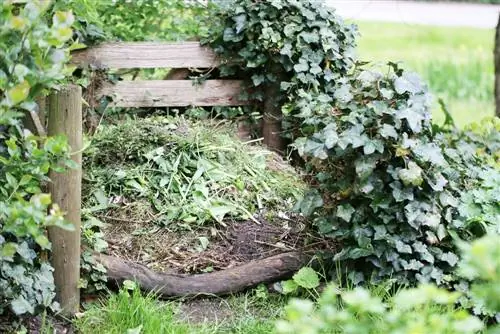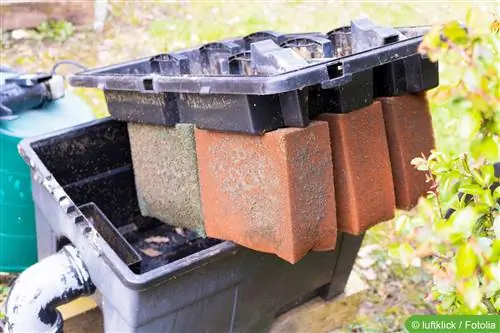- Author admin caroline@plants-knowledge.com.
- Public 2023-12-17 03:39.
- Last modified 2025-01-24 12:45.
A well-mixed compost with solids of different sizes requires little attention and care. When organic waste piles up on the container, it's time to take action. There are many ways in which you can positively support the rotting processes in compost. Products from the garden center promise many benefits, but cause unwanted side effects. Compost accelerators made with home remedies are a natural and effective solution.
How compost accelerators work
Numerous microorganisms in the compost ensure that animal and plant remains are decomposed. They excrete the nutrients contained therein and make them available to the plants. Compost works at a humidity of 80 percent and temperatures of at least 15 degrees Celsius. Nitrogen and carbon provide the energy necessary for the microorganisms' metabolism to function, but the conditions in the compost are not always optimal for the living organisms. Compost accelerators improve the conditions for the rotting processes. They increase the temperature inside and provide soil organisms with additional nutrients.
Note:
Did you know that sugar or molasses promote hot rot? This creates temperatures between 60 and 70 degrees Celsius, so that unwanted weed seeds are killed.
Commercial powders
In the garden market you will find a wide selection of compost accelerators with different compositions. The powdered agents mainly contain nitrogen, phosphorus and potassium. Therefore, these accelerators are called NPK. Horn or bone meal is often used as a nitrogen source. They are rich in enzymes and trace elements that come from stone and algae flour. These additives also ensure that unpleasant odors are suppressed. Despite the promising advantages, these mixtures come with some disadvantages:
- expensive to buy
- Macroorganisms such as worms, woodlice and millipedes do not like the additives
- animal ingredients can attract black flies
Inoculation with compost
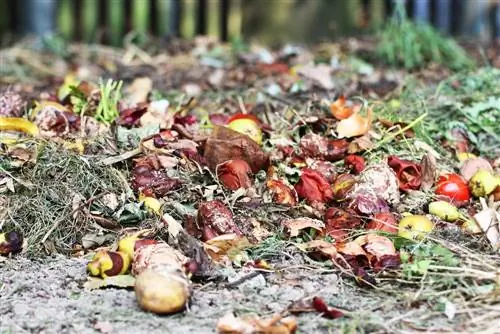
To give freshly created compost a jump start, you can mix a few shovels of mature compost with the organic waste. The finished fertilizer contains numerous microorganisms and bacteria, so you can inoculate the newly made compost. To further accelerate the rotting processes, you should water the compost regularly. Make sure that the substrate does not become too waterlogged. In order for the organisms to work optimally, the compost must be sufficiently aerated. However, this variant has some disadvantages:
- Compost must be moved so that microorganisms can spread
- only useful in warm temperatures
- Weed seeds and fungal spores can be transferred from the old to the new compost mix
Yeast solution
If your compost is too full, you can make your own compost accelerator using ingredients from the kitchen. Crumble a fresh yeast cube into a pot of lukewarm water and dissolve around 500 to 1000 grams of sugar in it. Let the brew steep for about two hours and then pour it into a watering can. Fill the jug with water to dilute the solution. Poured over the compost, you can observe the positive effects of the compost accelerator within a few days:
- Yeast multiplies rapidly and the temperature increases
- Heat accelerates decomposition
- Water and sugar support the activity of microorganisms
- Compost collapses after a few days
- can also be used in winter
Tip:
Did you know that you can grow your own yeast using ripe apples or unsulfured dates? The pieces of fruit are simply filled into a screw-top jar with water and sugar and placed in a warm place until bubbles form.
worm humus
With one liter of warm water, 250 milliliters of molasses and 200 grams of worm castings, you can make a natural compost accelerator that also acts as a soil improver. Worm castings are also known as worm castings and are typically used as biological fertilizers. The substrate is enriched with countless bacteria and microorganisms. In compost, this special soil has positive effects because the living creatures attract earthworms and thereby support the breakdown processes of organic material. Plants that you fertilize with the mature compost benefit from numerous advantages:
- improved root growth
- increased water storage capacity in the substrate
- better soil storage capacity for nutrients
- Pollutants in the soil are bound
Plant manure
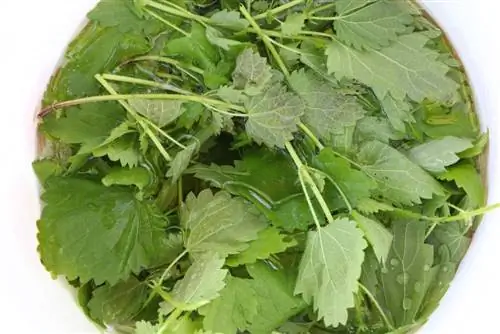
Plant decoctions not only serve as a strengthening agent for vegetable plants, but can also accelerate the rotting processes in the compost. You can use fern fronds, nettle leaves, valerian or comfrey to make it. Collect about a kilogram of fresh leaves and pour lukewarm water over them. Rainwater is ideal for creating a manure. There are numerous bacteria and yeast fungi on the leaves. Placed in a warm place, the brew ferments because the microorganisms multiply and produce gases. Stir the mixture daily. After about three weeks the brew is ready to use. It is diluted with water in a ratio of 1:10 and poured over the compost. You don't have to filter out plant parts because they will decompose in the compost.
Tip:
Sprinkle a handful of rock dust into the brew. The flour binds unpleasant odors and ensures that the odor is not too strong.
Effective microorganisms
This term refers to mixtures that you can purchase in any gardening store. They consist of various microorganisms from the food industry. Among them are bacteria that are viable with or without oxygen. This makes effective microorganisms, EM for short, a perfect compost accelerator. Mix about one liter of the liquid solution with EM to about ten liters of water. This amount is enough to inoculate one cubic meter of compost.
- less odor nuisance
- annoying fruit flies disappear
- Organic waste decomposes into fresh soil in six to eight weeks
- can be used at any time in warm temperatures
EM in the Bokashi Bucket
Despite the advantages, there is a disadvantage that can occur when using effective microorganisms. The living things are only viable if the environmental conditions are right. If the temperatures fall below ten degrees Celsius, the microorganisms die. But you can also make use of effective microorganisms in winter by throwing your organic kitchen waste into an airtight plastic bin. These are crushed and sprayed with EM. The waste ferments under anaerobic conditions. It is important that the resulting juice is drained after a week at the latest. Otherwise, undesirable putrefactive processes will occur and the mass will give off unpleasant odors. There are special Bokashi buckets that close airtight and have a tap for convenient draining of the liquid. This miniature quick composter has many advantages:
- fermented substrate can be used after two weeks
- drained liquid serves as a valuable liquid fertilizer
- Vessel saves space
- Can be used in the kitchen
- no unpleasant smells

